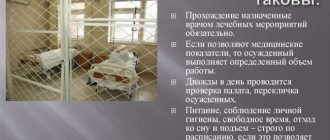Criminal Code of the Russian Federation in the latest edition:
Article 88 of the Criminal Code of the Russian Federation. Types of punishments imposed on minors
1. The types of punishments imposed on minors are:
a) fine;
b) deprivation of the right to engage in certain activities;
c) compulsory work;
d) correctional labor;
e) restriction of freedom;
f) imprisonment for a certain period.
2. A fine is imposed both if the convicted minor has independent income or property that can be levied against, or if there is none. A fine imposed on a convicted minor may, by a court decision, be collected from his parents or other legal representatives with their consent. A fine is imposed in the amount of one thousand to fifty thousand rubles or in the amount of wages or other income of a convicted minor for a period of two weeks to six months.
3. Compulsory work is assigned for a period of from forty to one hundred and sixty hours, consists of performing work that is feasible for a minor, and is performed by him in his free time from study or main work. The duration of execution of this type of punishment by persons under the age of fifteen years cannot exceed two hours a day, and by persons aged from fifteen to sixteen years - three hours a day.
4. Correctional labor is assigned to convicted minors for a period of up to one year.
5. Restriction of freedom is imposed on convicted minors as the main punishment for a period of two months to two years.
6. Punishment in the form of imprisonment is imposed on convicted minors who committed crimes before the age of sixteen for a period of not more than six years. For the same category of minors who have committed particularly serious crimes, as well as for other convicted minors, punishment is imposed for a term of not more than ten years and is served in educational colonies. Punishment in the form of imprisonment cannot be imposed on a convicted minor who committed a crime of minor or medium gravity for the first time at the age of sixteen, as well as other juvenile convicts who committed crimes of minor gravity for the first time.
6.1. When a convicted minor is sentenced to imprisonment for committing a grave or especially grave crime, the lower limit of punishment provided for by the relevant article of the Special Part of this Code is reduced by half.
6.2. If a juvenile convict who has been given a conditional sentence has committed a new crime during the probationary period that is not particularly serious, the court, taking into account the circumstances of the case and the identity of the perpetrator, may re-decide on a conditional sentence, establishing a new probationary period and assigning fulfillment of certain duties provided for in part five of Article 73 of this Code.
7. The court may give instructions to the body executing the punishment to take into account certain characteristics of his personality when treating a convicted minor.
Return to the table of contents of the document: Criminal Code of the Russian Federation in the latest edition
Comments on Article 88 of the Criminal Code of the Russian Federation
In Art. 88 of the Criminal Code of the Russian Federation provides for an additional, or truncated, system of punishments. The additional system is derived from the main system of punishments, since it does not contain a single type of punishment that is not included in the main system (Article 44 of the Criminal Code of the Russian Federation).
The range of punishments that can be imposed on minors is narrower than the general list of punishments given in Art. 44 of the Criminal Code of the Russian Federation. Outside the list given in Art. 88 of the Criminal Code of the Russian Federation, no other types of punishment can be applied to minors.
Thus, the following cannot be applied to minors:
- deprivation of a special, military or honorary title, class rank or state awards;
- deprivation of the right to hold certain positions, which is an integral part of the punishment in the form of deprivation of the right to occupy certain positions or engage in certain activities;
- restriction on military service;
- detention in a disciplinary military unit;
- life imprisonment;
- the death penalty.
Types of punishments applied to minors
Fine
A fine is applied as both a primary and an additional form of punishment. It can be assigned regardless of whether the minor has independent income or property that may be subject to seizure.
A fine may be imposed on a minor in the amount of one thousand to fifty thousand rubles or in the amount of the wages or other income of the convicted minor for a period of two weeks to six months.
A fine imposed on a minor, by court decision, may be collected from his parents or other legal representatives with their consent. Such a decision by the court may be made at the request of parents or other legal representatives and after the verdict enters into legal force in the manner provided for in Art. 397 Code of Criminal Procedure of the Russian Federation. In any case, the court must verify the voluntariness of such consent and the solvency of the parents or other legal representatives, and also draw their attention to the consequences of failure to comply with the court decision to collect a fine.
If the parents or other representatives of a convicted minor evade paying a fine, then its collection is carried out in the manner prescribed by the legislation of the Russian Federation (the writ of execution is handed over to the bailiff, who decides on the collection of the fine in the manner of enforcement proceedings).
The forced collection of a fine can be applied to the wages or other income of the convicted person, therefore, for example, a penalty cannot be imposed on a monthly child benefit, which is not income and, therefore, the object of collection.
In case of malicious evasion by a minor convicted of paying a fine imposed as the main punishment, it, in accordance with Part 5 of Article 46 of the Criminal Code of the Russian Federation, is replaced by another type of punishment, taking into account the provisions of Article 88 of the Criminal Code of the Russian Federation. A fine imposed on a convicted minor may, by a court decision, be collected from legal representatives, for example, from parents or adoptive parents with their consent. Such a decision can also be made at their request after the verdict has entered into legal force in the manner prescribed by Article 399 of the Code of Criminal Procedure of the Russian Federation. In any case, the court should verify the voluntariness of the consent and solvency of such persons, and also explain the consequences of non-execution of the court decision to collect a fine (clause 21 of the Resolution of the Plenum of the Supreme Court of the Russian Federation dated 01.02.2011 N 1 “On the judicial practice of applying legislation regulating the specifics of criminal liability and punishment of minors").
Taking into account the circumstances provided for in Part 3 of Art. 46 of the Criminal Code of the Russian Federation, a fine may be imposed with installment payment in certain installments for a period of up to five years or with its deferment for the same period on the grounds provided for in Art. 398 Code of Criminal Procedure of the Russian Federation.
Deprivation of the right to engage in certain activities
Only this type of punishment can be applied to minors - a ban on engaging in activities (for example, driving a vehicle).
Punishment in the form of deprivation of the right to hold certain positions cannot be imposed on a minor (even if he has reached the age of majority at the time of sentencing).
Bodies authorized to cancel a permit to engage in the relevant activity no later than three days after receiving a copy of the court verdict and a notice from the criminal-executive inspection are obliged to cancel the permit to engage in the activity that is prohibited to the convicted person, seize the relevant document granting this person the right to engage in this activity, and send reporting this to the criminal-executive inspection.
Those sentenced to deprivation of the right to engage in certain activities are required to comply with the requirements of the sentence, submit, at the request of the criminal-executive inspection, documents related to serving the specified sentence, report to the criminal-executive inspection about the place of work, its change or dismissal from work, as well as about a change of place residence.
Mandatory work
Compulsory work consists of performing work that is feasible for a minor, performed by him in his free time from study or main work. When assigning and executing them, it should be taken into account that such punishment should not cause harm to the health of the teenager and disrupt the learning process.
Compulsory work is assigned to minors for a period of forty to one hundred and sixty hours. The duration of execution of this type of punishment by persons under the age of fifteen years cannot exceed two hours a day, and by persons aged from fifteen to sixteen years - three hours a day. The differentiated daily duration of performance of compulsory labor by persons aged 14 to 15 years, from 15 to 16 years and from 16 to 18 years old relates to the order of its execution, therefore this issue is not subject to reflection in the sentence.
Punishment in the form of compulsory labor is carried out by the penal inspection at the place of residence of the convicted person.
Compulsory work is performed by convicted persons free of charge. The period of compulsory labor is calculated in hours during which the convicted person served compulsory labor.
In relation to convicts who maliciously evade serving compulsory labor, the penal inspection sends to the court a proposal to replace compulsory labor with another type of punishment in accordance with Part 3 of Art. 49 of the Criminal Code of the Russian Federation.
Correctional work
Based on the nature of correctional work, they apply only to persons with whom, in accordance with labor legislation, an employment contract can be concluded. Correctional labor is assigned to minors for a period of two months to one year. The beginning of their term of service is the day the convicted person goes to work. The time during which the convicted person did not work is not counted towards the term of serving (Part 3 of Article 42 of the Penal Code of the Russian Federation).
From the salary of a person sentenced to correctional labor, deductions are made to the state income in the amount established by a court verdict, ranging from 5 to 20%.
The imposition of punishment in the form of correctional labor is also possible in relation to a minor studying in general education institutions, institutions of primary vocational, secondary vocational, higher vocational education, except in cases where its execution may actually impede the continuation of education, for example, in full-time education.
As a general rule, correctional labor can be assigned to a minor who has reached the age of 16 years, for a period of two months to one year, and in cases of receiving general education, or continuing to master the basic general education program of general education in a form of education other than full-time, or with consent of one of the parents and in other cases provided for in Parts 2 and 3 of Art. 63 of the Labor Code of the Russian Federation, and a minor who has reached the age of 15 and 14 years, respectively.
Persons sentenced to punishment in the form of correctional labor and compulsory labor are subject to the norms of the Labor Code of the Russian Federation on the specifics of regulating the labor of workers under the age of 18.
In case of malicious evasion of a minor from serving correctional labor and replacing it with a sentence of imprisonment, it should be borne in mind that such a replacement is impossible in relation to those categories of juvenile convicts who, in accordance with Part 6 of Art. 88 of the Criminal Code of the Russian Federation, a sentence of imprisonment cannot be imposed.
Restriction of freedom
Restriction of freedom is imposed on convicted minors as the main punishment for a period of two months to two years. Restriction of freedom is not imposed on minors as an additional punishment.
Types of restrictions . In accordance with Art. 53 of the Criminal Code of the Russian Federation, restriction of freedom consists of the court establishing the following restrictions for the convicted person:
- do not leave your home (apartment, other home) at a certain time of the day;
- not to visit certain places located within the territory of the relevant municipality;
- do not travel outside the territory of the relevant municipality;
- not to visit venues of mass and other events and not to participate in these events;
- not to change the place of residence or stay, place of work and (or) study without the consent of the specialized state body supervising the serving of sentences in the form of restriction of freedom by convicted persons.
In this case, the court imposes on the convicted person the obligation to appear at the specialized state body that supervises the serving of sentences in the form of restriction of freedom by convicted persons from one to four times a month for registration. The establishment by the court of restrictions on a convicted person to change his place of residence or stay without the consent of the specified specialized state body, as well as to travel outside the territory of the relevant municipality is mandatory.
Deprivation of liberty
Imprisonment is imposed on minors only in exceptional cases, determined by the nature and degree of public danger of the crime, the circumstances of its commission and the personality of the perpetrator.
The Criminal Code of the Russian Federation prohibits the application of the most severe type of criminal punishment - imprisonment to minors who have committed a crime of minor or moderate gravity for the first time under the age of 16, as well as to other minors who have committed crimes of minor gravity for the first time.
Committing a crime for the first time . A person who has committed one or more crimes, for none of which he was previously convicted, or when the previous sentence against him has not entered into legal force, should be considered to have committed a crime of minor or medium gravity for the first time. First-time offenders will also include persons in respect of whom a criminal record has been withdrawn or expunged in accordance with the procedure established by law.
Imprisonment for a crime committed before the age of 16 . Imprisonment is imposed on convicted minors who committed crimes before the age of 16 for a period of not more than 6 years. This rule for assigning imprisonment to minors of the specified age category applies to cases of minors committing crimes of any category, with the exception of especially serious crimes.
If a crime of minor or medium gravity was committed by a convicted person under 16 years of age, not for the first time, then imprisonment may be imposed on him within 6 years, including for any combination of crimes (combination of crimes), as well as when a punishment is imposed in the aggregate sentences.
The same category of minors, that is, those who committed a crime under the age of 16, but the crimes are especially serious - imprisonment can be imposed for a term of up to 10 years.
10 years of imprisonment is the maximum term for minors and older age categories (from 16 to 18 years) who have committed crimes of any gravity (exceptions are established in Part 6 of Article 88 of the Criminal Code of the Russian Federation).
If a minor cannot be sentenced to imprisonment, and the sanction of the article of the Special Part of the Criminal Code of the Russian Federation under which he is convicted does not provide for another type of punishment, another, milder type of punishment must be assigned, taking into account the provisions of Article 88 of the Criminal Code of the Russian Federation. In this case, reference to Article 64 of the Criminal Code of the Russian Federation is not required (clause 17 of the Resolution of the Plenum of the Supreme Court of the Russian Federation dated 01.02.2011 N 1 “On the judicial practice of applying legislation regulating the specifics of criminal liability and punishment of minors”).
Serving a sentence in educational colonies . All convicted minors are serving a sentence of imprisonment in educational colonies.
In educational colonies, ordinary, simplified, preferential and strict conditions for serving sentences are established.
Under normal conditions, juvenile convicts who were admitted to a juvenile correctional colony serve their sentences in educational colonies, except for those who previously served imprisonment and those convicted of intentional crimes committed while serving their sentence, as well as juvenile convicts transferred from lightened, preferential or strict conditions of serving their sentence.
Those convicted of intentional crimes committed while serving imprisonment, and those who previously served imprisonment, serve their sentences under strict conditions. Convicts who are recognized as malicious violators of the established procedure for serving their sentences and who have been transferred from regular and lighter conditions of serving their sentences also serve their sentences under strict conditions. After six months, in the absence of penalties for violating the established procedure for serving the sentence and with a conscientious attitude to work and study, they are transferred to the usual conditions of serving the sentence.
In the absence of penalties for violations of the established procedure for serving a sentence and a conscientious attitude to work and study, convicts can be transferred from ordinary conditions of serving a sentence to lighter ones.
To prepare for release, convicts serving their sentences in light conditions are transferred to preferential conditions for serving their sentences.
Reducing punishment in juvenile cases . In cases where in cases of minors there are circumstances that influence the reduction of punishment (for example, Art. 62, 65 of the Criminal Code of the Russian Federation), they must be applied, and the calculation of the corresponding terms must be made from the terms of punishment established for minors. For example, a minor aged 17 is convicted of aggravated murder. The maximum term of imprisonment in this case can be ten years. But the circumstances established in the case, provided for in Art. 62 of the Criminal Code of the Russian Federation, for example, surrender, and there are no aggravating circumstances. In this case, the maximum term of imprisonment cannot exceed seven years and six months of imprisonment.
Sentencing minors for multiple crimes . If a person commits several crimes, some of which were committed as a minor, and others as an adult, the courts should take into account that for crimes committed as a minor, punishment must be imposed within the limits established by Art. 88 of the Criminal Code of the Russian Federation, and for crimes committed at the age of majority - within the limits of the sanctions established for the relevant crimes. In this case, when assigning the final punishment, the rules for assigning punishment for the totality of crimes are applied (Article 69 of the Criminal Code of the Russian Federation).
When imposing punishment for several crimes, some of which do not provide for the possibility of imposing imprisonment on a minor, the final punishment can be imposed in the form of imprisonment both when a less severe punishment is absorbed by a more severe one (Part 2 of Article 69 of the Criminal Code of the Russian Federation), and in case of partial or complete addition of punishments of different types, taking into account the procedure for determining the terms of punishment when adding them (part 1 of article 71, part 3 of article 69 of the Criminal Code of the Russian Federation).
Reducing the lower limit of punishment for a minor . Part 6 of Article 88 of the Criminal Code of the Russian Federation establishes a provision according to which, when imposing a punishment on a minor for committing a serious or especially serious crime, the lower limit of punishment provided for by the corresponding article of the Special Part of the Criminal Code of the Russian Federation is reduced by half and at the same time references to Art. 64 of the Criminal Code of the Russian Federation is not required (for example, for murder, qualified under the first part of Article 105 of the Criminal Code of the Russian Federation, a minor may be sentenced from three to ten years in prison).
When deciding on the imposition of punishment on minors, attention should be paid to the fact that the provisions of Part 6.1 of Art. 88 of the Criminal Code of the Russian Federation on reducing the lower limit of punishment provided for by the relevant articles of the Special Part of the Criminal Code of the Russian Federation, relate only to punishment for committing a grave or especially grave crime in the form of imprisonment and other types of punishment, including compulsory labor and correctional labor , do not apply.
When discussing the issue of sentencing a minor in the descriptive-motivational and operative parts of the sentence, reference should be made to Part 6.1 of Art. 88 of the Criminal Code of the Russian Federation.
Limitation periods and expiration periods for criminal records
In addition to parole, a lawbreaker who has not reached the age of majority may be freed from criminal liability due to the expiration of the statute of limitations. They are established by Article 78 of the Criminal Code, and are equal to:
- 2 years for minor crimes;
- 6 years for crimes of medium gravity;
- 10 years for serious crimes;
- 15 years for especially serious crimes.
It is important to remember that for persons under 18 years of age, these terms are halved. Also, Article 83 of the Criminal Code states that a person convicted of committing an offense may be released from punishment if the court decision was not executed within the following periods from the moment the sentence entered into legal force:
- 2 years for minor crimes;
- 6 years for crimes of medium gravity;
- 10 years for serious crimes;
- 15 years for especially serious crimes.
The only category of crimes to which statutes of limitations do not apply, even in the case of teenagers, are crimes against peace and humanity. These include military actions, the use of prohibited means and methods of warfare, and more.
Another article 95 of the Criminal Code establishes shortened terms for expunging criminal records for citizens who have not reached the age of majority at the time of committing a crime. Thanks to this, a teenager who ends up behind bars can also receive release before the deadline set by the court sentence, if conditional release for any reason could not be achieved. Moreover, offenses that a person committed before reaching the age of majority are not taken into account when recognizing recidivism of crimes, as stated in Part 4 of Article 18 of the Criminal Code of the Russian Federation.
If a teenage offender has all the prerequisites for parole, he can submit a petition for release to the administration of the colony or correctional institution, from where it will be sent to the court. And at this point in your journey to freedom, the help of a knowledgeable criminal defense attorney may be essential. After all, just drawing up an application for parole can be quite a difficult task. A well-drafted petition can increase the chances of release.
Conditional sentence of a minor
The rules of application of Art. 73 of the Criminal Code of the Russian Federation, but part 6.2 of Article 88 of the Criminal Code of the Russian Federation provides for certain benefits for the repeated application of a suspended sentence compared to adult convicts. This benefit consists of expanding the categories of crimes for which a suspended sentence can be maintained and a suspended sentence can be re-imposed.
Part 2 of Article 88 of the Criminal Code of the Russian Federation establishes that if a juvenile convict who has been given a suspended sentence commits a new crime during the probationary period that is not particularly serious, the court, taking into account the circumstances of the case and the identity of the perpetrator, may re-decide on a suspended sentence, establishing a new probationary period and imposing on the conditionally convicted person the performance of certain duties provided for in Part 5 of Art. 73 of the Criminal Code of the Russian Federation.
The decision to re-apply a suspended sentence can be made by the court, taking into account the circumstances of the case and the personality of the convicted person (minor role in committing a new crime, full admission of guilt and active repentance, compensation for property damage, positive characterization, etc.). In this case, both sentences will be executed independently.
But, if the court, upon re-conviction, imposes a punishment according to the rules of the totality of sentences, the conditional sentence must be canceled in accordance with Part 5 of Art. 74 of the Criminal Code of the Russian Federation. Otherwise, the reference to Art. 70 of the Criminal Code of the Russian Federation.
When a minor is given a suspended sentence, in addition to the duties that may be assigned to him in the manner provided for in part five of Art. 73 of the Criminal Code of the Russian Federation, the court, in accordance with the Federal Law of June 24, 1999 “On the Basics of the System for the Prevention of Neglect and Juvenile Delinquency,” if there are grounds for this, has the right to oblige the convicted person to undergo a course of social and pedagogical rehabilitation (psychological and pedagogical correction) in educational institutions, providing pedagogical and psychological assistance to minors with developmental disabilities.
In accordance with the same Law, imposing on a minor the obligation to return to an educational institution to continue studying is possible only if there is a conclusion from the psychological, medical and pedagogical commission of the governing body.
When deciding on a suspended sentence for a minor for a new crime that is not particularly serious, it should be borne in mind that in accordance with Part 6.2 of Art. 88 of the Criminal Code of the Russian Federation, the probationary period for each of the sentences is calculated independently within the framework of the established sentences, which are also executed independently.
Replacement of punishment for a minor in the event of his malicious evasion from serving it
Provisions of Part 3 of Art. 49, part 4 art. 50 and part 5 art. 53 of the Criminal Code of the Russian Federation on the replacement of punishment in the form of compulsory labor, correctional labor, restriction of freedom in case of malicious evasion from serving them with a sentence of imprisonment should be applied to juvenile convicts, taking into account their personality, as well as the reasons for malicious evasion from serving the sentence if they are recognized as impossible corrections without isolation from society and with the reasons for the decision made.
The provisions of Part 3 of Article 49, Part 4 of Article 50 and Part 5 of Article 53 of the Criminal Code of the Russian Federation are not applicable to those categories of juvenile convicts who, in accordance with Part 6 of Article 88 of the Criminal Code of the Russian Federation, cannot be sentenced to imprisonment (clause 5.9 of the Resolution of the Plenum of the Supreme Court of the Russian Federation dated December 20, 2011 N 21 “On the practice of application by courts of legislation on the execution of sentences”).
Release of a minor from serving a sentence
Article 92 of the Criminal Code of the Russian Federation provides types of release of a minor from serving a sentence. Young criminals can either be released from punishment in exchange for the application of compulsory educational measures against them, or transferred to a specialized educational institution. These types of releases from punishment are not conditional. Such release in the future cannot be canceled with the subsequent return of the offender to prison. According to Part 2 of Article 86 of the Criminal Code, a minor released under Article 92 is recognized as having no criminal record.
The main purpose of using imprisonment for criminals under the age of majority is their re-education. Therefore, instead of being sent to places not so distant, a young lawbreaker may be sent to an educational institution. Such institutions include special schools, vocational schools and closed correctional educational institutions.






